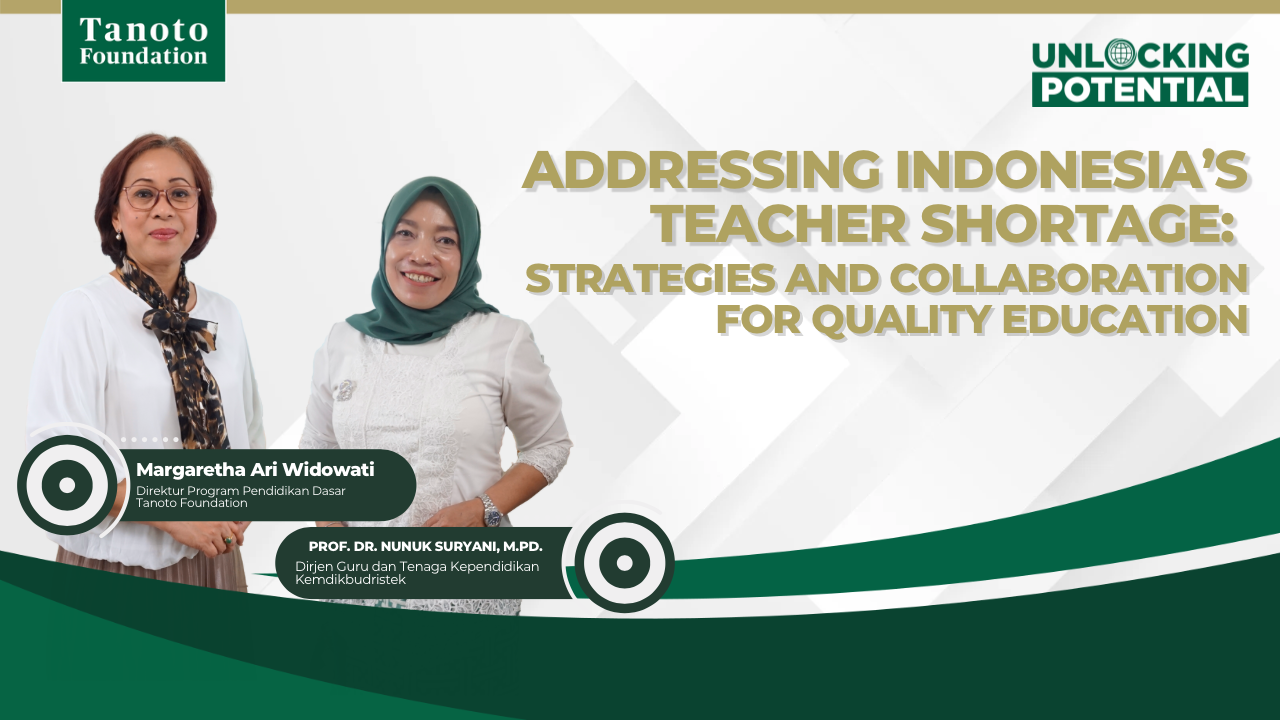Addressing Indonesia’s Teacher Shortage: Strategies and Collaborations for Quality Education

In a conversation with Margaretha Ari Widowati, the Director of Primary Education at the Tanoto Foundation, Professor Dr. Nunuk Suryani, who is the Director General of Teacher and Educational Staff at the Ministry of Education, Culture, Research, and Technology, discussed the challenges the Ministry faces in ensuring the provision of high-quality teachers while simultaneously enhancing the competence of teachers throughout Indonesian.
The quality of teachers in Indonesia is a pressing concern for the Minister of Education, Culture, Research, and Technology, Nadiem Makarim. The country currently has a total of four million teachers, including three million formal and one million informal teachers. Unfortunately, a significant portion of them lacks certification, contrary to the requirements outlined in the 2005 Teachers and Lecturers Law, which mandates fulfillment of qualification and competence criteria.
Professor Nunuk explained the strategy to upgrade teacher qualifications and competence, emphasizing that new teacher recruits must meet the established standards for qualification and competence. In the new recruitment system, teacher candidates are required to be graduates of S1 or D4 (Teachers Professional Education Program) programs and must undergo the Professional Teacher Education Program (PPG) before commencing their teaching duties.
Quoting data from the Ministry, Ari from Tanoto Foundation pointed out that Indonesia is facing an imminent teacher shortage crisis, expecting a shortfall of 1.3 million teachers in 2024. This raises the question of how the Ministry plans to address this crisis.
While acknowledging the issue, Nunuk highlighted that they have implemented several measures to mitigate the impending shortage. Initial projections estimate a deficit of 1.3 million teachers in 2024, with 70,000 teachers retiring annually. Fortunately, the Ministry has managed to address this situation through a special recruitment program launched by the minister in 2021, aiming to recruit civil servant teachers under a governmental employment agreement (ASN PPPK), potentially filling one million teaching positions. Over the past three years, the Ministry has already recruited 544,000 new teachers, ensuring their quality through this accelerated policy to alleviate the teacher shortage.
Dealing with Regional Governments
There are two notable obstacles in the recruitment of teachers. The first pertains to the Ministry’s presence of non-civil servants or non-permanent teachers in schools. The second challenge revolves around addressing issues arising from the annual retirement of teachers, reaching a count of 70,000.
“The Ministry grapples with a misalignment with regional governments. Discrepancies often arise between the Ministry and regional governments regarding the accurate data on required teachers. In 2023, the Ministry aims to hire 600,000 new teachers, but the regional governments indicate a need for only 300,000 teachers,” explained the senior bureaucrat.
But, the most important thing is to provide quality teachers in the education system. “In recruiting quality teachers, we must collaborate with other ministries and local authorities,” she explained.
The Ministry collaborates with the National Selection Committee to ascertain the precise number of teachers needed. Subsequently, the proposal is forwarded to the Bureaucratic Reform Ministry. Following this, the Finance Ministry handles the remuneration of the teachers. Finally, the comprehensive package is presented to local governments.
“There exists a disparity between the Ministry and regional authorities. If this discrepancy persists, the balance between supply and demand will remain uneven,” said the director general.
Teachers Talent Pool
One proposed solution to address the teacher recruitment challenge is the establishment of a ‘marketplace’ or a Teachers’ Talent Pool. The Ministry’s responsibility is to supply qualified teachers, allowing schools to choose the teachers they require directly from this pool
“With the pool, the process of hiring will be simpler. The Ministry shares the recruitment responsibility with regional governments. The regions just need to pick the candidates they need from the pool,” said Nunuk.
Nevertheless, she recognized the difficulty in finding qualified teachers. Attracting quality teachers is a challenge due to a lack of interest in the profession, despite extensive campaigns. Many candidates do not meet the requirements, with only a maximum of 50 percent meeting the qualifications
Collaboration with Philanthropic Sector
The Ministry believes that collaboration with the private sector can help bridge the gap and ensure that each region receives teachers in line with their specific needs, focusing on critical subjects like mathematics.
Finding qualified teachers remains a challenge, and the Ministry is actively seeking partnerships with private sectors and philanthropic organizations to attract young talent to the teaching profession.

Leave a Reply